Unit 1 | The Colonial Era
1/102
There's no tags or description
Looks like no tags are added yet.
Name | Mastery | Learn | Test | Matching | Spaced | Call with Kai |
|---|
No analytics yet
Send a link to your students to track their progress
103 Terms
Common practices and spiritual values of the native tribes
Hopi tribe:
Tawa = Sun God (controlled magic “above”)
Spider Woman = Earth Goddess (controlled magic “below”)
Kivas = room for religious rituals underground
Valued animals, represent different clans
Family descends through women
Gender roles are more flexible
Early native American groups origin
Scholars believe the first Americans originated from Asia
Iroquois location
Northeast (east coast)
Pequot location
New England Colonies (Connecticut)
Powhatan location
Virginia (Jamestown)
Powhatan Conflict
Powhatan’s tribe vs. Starving colonists
English captured Pocahontas + converted her to Christianity + made her marry John Rolfe
Powhatan death —> Opechancanough = new chief
Algonkian location
Northeast (east coast)
Cahokia (mound builders) location
Near Illinois/Mississippi
Reasons for Exploration in Europe
Extreme wealth/extreme poverty
Competition w/ other monarchs
New ideas from Renaissance about individualism + spread of info about new/unknown regions
Wanted to trade but Ottomans (Muslim) controlled trade to Asia
Religious conflict
Protestantism vs. Catholicism, who can spread their beliefs first/more
Order of European Countries Colonizing/Exploring
Spain, Portugal, France, England, Dutch
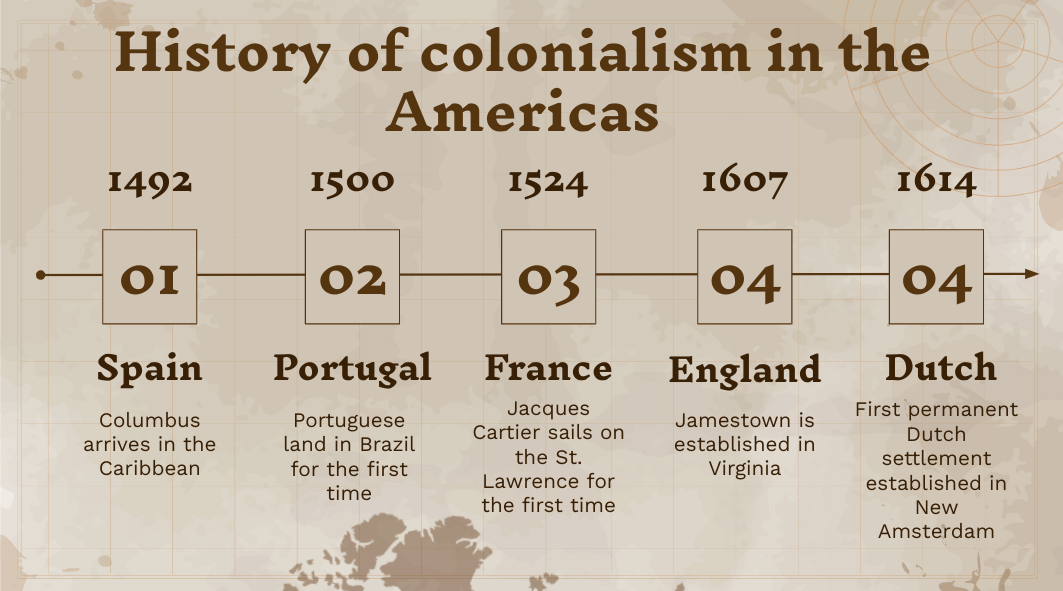
Spanish Reasons for Colonization
Spread Christianity
Spread Spanish culture
Conquerer as much land as possible
Wanted $ —> mining silver/gold
Spanish Explorers/Locations Settled
Conquistadors
Americas, New Spain (Mexico, Central America, Caribbean), Peru
Spanish Method of Colonization
Conquered territories in already established colonies
Social Hierarchy = Caste System
Peninsulares, Creoles, Mestizos, Indians, Mulattoes, Slaves
Encomienda System
Friars = spread religion
Island Hopping
Spanish Relationship w/ Natives
Treated harshly
Forced labor + enslaved to mine for gold/silver
Why New Spain wasn’t as Successful
Caste System in New Spain isn’t appealing to immigrants b/c only a small % of settlers have good rights, and likely had better rights in Spain
French Reasons for Colonization
Not interested in colonizing
Sought to find Northern Passage
(water route to Asia through waters of present-day Canada)
Spread religion (catholic)
Jesuit missionaries
French Important Explorers/Locations Settled
St. Lawrence River
Giovanni de Verranzo + Jaques cartier
Quebec = 1st European settlement in Canada
Founded by Samuel de Champlain
Trading post
French Methods of Colonization
Traded metal items/weaponry that was valuable to indians
Less forceful (typically)
Spread religion (but tolerant) —> spread influence
Couldn’t afford enslaving Indians, needed hunters/suppliers
Only took a little land —> lessened conflict w/ natives
French Relationship w/ Natives
Friendly trading
Champlain attacked Iroquois camp w/ guns —> Indians switching from mass formations to hit-and-run tactics (used trees as cover)
Couldn’t afford enslaving Indians, needed hunters/suppliers
Only took a little land —> lessened conflict w/ natives
Why French Colonies weren’t Successful
Weren’t aggressive, didn’t focus on colonizing/making money
English Reasons for Colonization
Compete with other European countries for power, wealth, glory
Be self-sufficient (mercantilism)
More exports, less imports
Wanted raw materials
+ England had issues:
Religious conflict + too large population
English Explorers/Location Settled
John Smith = leader of Jamestown Colony
Sir Francis Drake = burned Augustine (Spanish Ship)
Virginia/Jamestown
English Methods of Colonization
Charter issued by King James to colonized
Allowed everyone to settle (poor, persecuted, etc)
VA Company funded colonization
lots of rich investors instead of 1 king
shared/mutual interest in colonizing
English Relationship w/ Natives
Treated harshly/hostility at first
Natives offered food/hospitality —> colonies becoming more dependent
John Smith wanted to make Natives laborers (like Spain)
After learning Native tips, turned on them + burned crops/villages, forced them out of land, etc.
Dutch (Netherlands) Reasons for Colonization
Find path to Asia
Instead: New Netherlands (NY)
Set up for trade
Dutch (Netherlands) Explorers/Locations Settled
Henry Hudson explored Hudson River
Peter Minuet bought Mannhattan from Natives
Dutch (Netherlands) Methods for Colonization/Patroonship
Patroonship system encouraged immigration
Stockholders in Dutch West Indian Company were promised more land if they brought more immigrants within 4 yrs
Immigrants became farmers (similar to feudal system)
Social hierarchy based on agriculture
Why the Dutch (Netherlands) Weren’t Successful
Didn’t get enough immigrants b/c feudal system was worse than life in Netherlands
no reason to leave
Dutch (Netherlands) Relationship with Natives
Peaceful @ first for trade
Later greedy + destroyed/disrupted Native land
Early slave trade
1619 first Africans brought to Americas
Originally indentured servants
Life expectancy increase in slaves —> increase purchasing of slaves b/c they had lifelong servitude
1 time purchase, cheaper than European indentured servants
Columbus
Sailed for Spain (conquistador)
Wanted to find an alternate route to China
Conquistadors
Spanish and Portuguese soldiers/explorers who carried out conquests and explorations
Sailed beyond the Iberian Peninsula to the Americas, Oceania, Africa and Asia, to est. colonies + trade routes
St. Augustine
Quebec
Founded by Samuel de Champlain
1st European settlement in Canada
Fortified trading post
Created b/c they wanted to trade w/ Natives for fur
New France
Canada
initially by St. Lawrence River, Newfoundland, Acadia (Nova Scotia)
later included Great Lakes region
“big river”
Mississippi river
carried trade/goods: furs, corn, wheat, cotton, sugar, tobacco, etc.
trade —> distinct cultures
encomienda system
form of forced and unpaid labor used by Spanish colonies
laborers were given military protection and the opportunity to be converted to Christianity
Spanish colonial rulers were supposed to provide protection + conversion to Christianity of Natives in exchange for their labor, however in practice the native population suffered immensely at the hands of the Spanish rulers.
mestizos
Spanish and Native descent
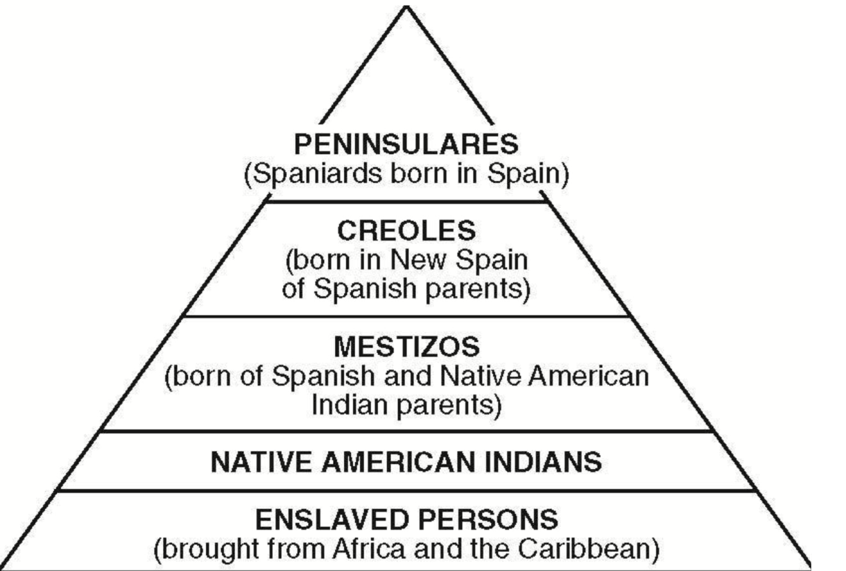
mulattoes
Spanish and African descent
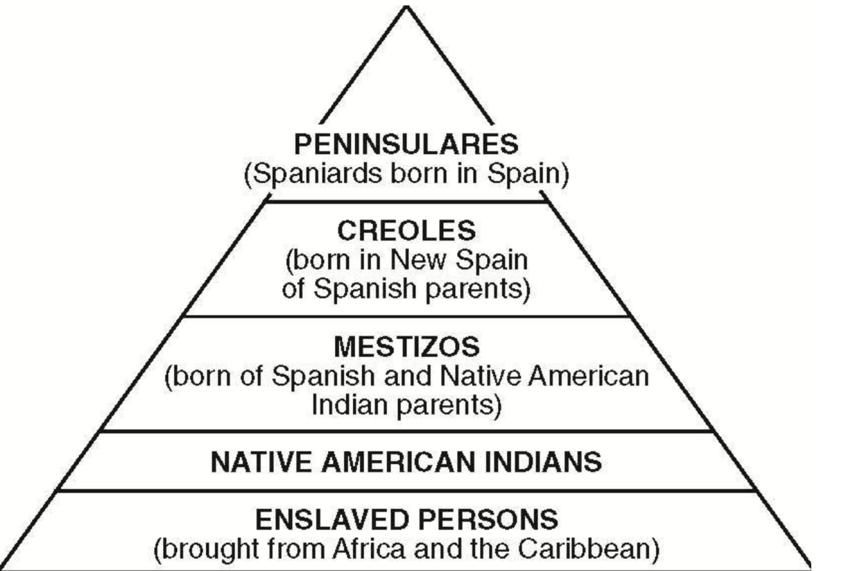
peninsulares
FULL Spanish descent, AND born in Europe
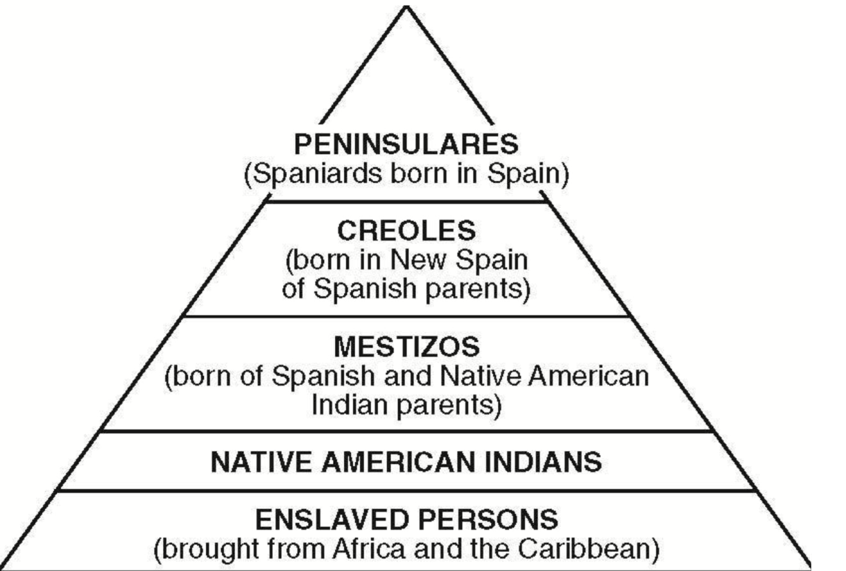
creoles
FULL Spanish descent, NOT born in Europe
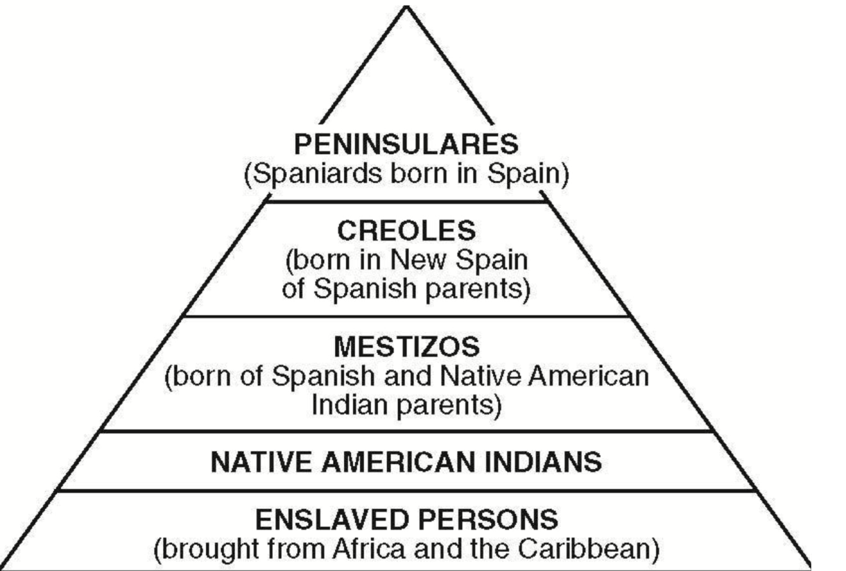
Trans-Atlantic Slave Trade/Triangular Trade
intentional trade across Atlantic ocean
England: exported manufactured goods
Americas: exported natural resources
Africa: exported enslaved laborers
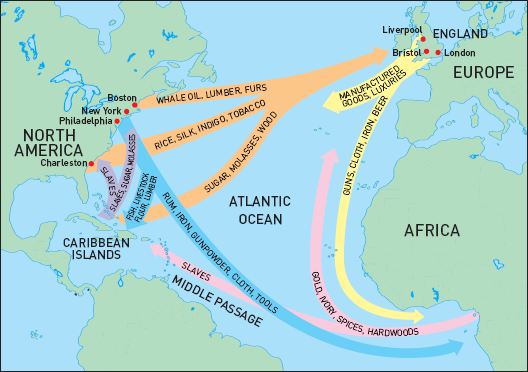
Columbian exchange
Natural exchange, less intentional
Exchange of foods, crops, diseases, animals/livestock between the New and Old Worlds
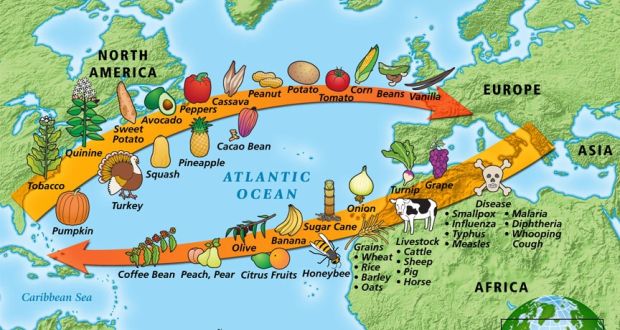
Roanoke
Attempted to colonize 2x, led by Sir Walter Raleigh
Infertile soil → poor crop yield
Difficult to land ships in harbor
(Group 1 abandoned, Group 2 disappeared)
Near SC not VA
Sir Walter Raleigh
English aristocrat
Failed 2x to create permanent settlement @ Roanoke
(Group 1 abandoned, Group 2 disappeared)
Infertile soil → poor crop yield
Difficult to land ships in harbor
Queen Elizabeth I
Queen of England
King James I
King of England
proprietary colonies
Belonged to powerful individuals/companies
think “property”
royal colonies
Belonged to the crown
“royal”
Virginia Company
Joint-stock company
Funded colonization
Obtained charter from the crown to colonize VA
Jamestown
First settlement in VA
est. 1607
Fertile land, good harbors, settled by James River
safe from Spanish ships, but vulnerable to interior Natives
Didn’t enslave Natives because they died from European diseases (weren’t immune)
starving time
winter of 1609-1610, when food shortages, fractured leadership, and a siege by Powhatan Indian warriors killed 2/3 colonists at James Fort
from the beginning, the colony struggled to maintain a food supply
¾ colonists died from starvation related deaths
John Smith
English soldier, explorer, colonial governor
Helped establish Jamestown
Viewed NA land as “overgrown/wild” and insisted on improving it into profitable land
(basically just wanted NA land)
John Rolfe
Forced Pocahontas to marry him
Taught colonists how to farm tobacco 1616
tobacco
VA’s main cash crop
Pocahontas
Chief Powhatan’s favorite daughter
Captured by English, and was converted to Christianity
Forced to marry John Rolfe
Chief Powhatan
Spoke Algonquian
Leader of the Powhatan
Didn’t confront colonists in fear of casualty, wanted to use colonists against his enemies (Natives of the interior)
English were impressed with his dignity, intelligence, build
1619
HOB is est.
Slavery introduced to American colonies
House of Burgesses
First representative body in US colonies
Present day VA General Assembly
Representative gov.
rich, free, white, landowning, “oath of supremacy” to kings James, men
HOB limited power/representation to lower classes, catered to wealthiest class —> bacon’s rebellion
headright system
1619
VA Co. offered 50 acres of land to anyone who paid passage/another persons passage
Wealthy colonists acquire large plantations
helped increase importing workers from England —> rise in population in VA
indentured servants
Agreed to 4-7 years of servitude in exchange for paid passage in Jamestown
After servitude, they are free and can buy/own land
Opportunity to increase social standing
Plymouth
1620
Separatists
Mayflower Compact
Mayflower Compact
Agreement to abide by their own gov.
Anglican Church: King hold power over the church + ppl = too much power
Ppl want freedom/democracy
Puritans
Wanted to PURIFY Anglican Church, NOT separate from it
MA Bay Colony
Separatists
Wanted to SEPARATE from the Anglican Church
Mayflower/Plymouth
Quakers
Radical Protestants
Distrusted the rich
Tolerated other faiths
Middle class (no clergy)
Believed all people were spiritually equal (men/women)
“Inner light”
Individual relationship with God
Pacifists
mercantilism
More exports than imports = more $$
decline of indentured servitude, slave boom, emergence of chattel slavery
enslaved African laborers began to rise in popularity b/c of increase in lifespan —> less buying of indentured servants
indentured servants served limited amt of time, slaves served for their life and were permanently denied their freedom
chattel slavery: having ownership of multiple slaves
New England colonies
Massachusetts (Plymouth + territory in Maine), Connecticut, Rhode Island, New Hampshire (MA, CT, RI, NH)
Long winters, rocky land —> poor/no large scale farming
Trees/forests, lots of fruit
Turkey, cattle, quails, pigeons, partridges, etc.
Great Lakes
Fish, water birds, beavers, otters
Main export = dry fish + whale oil
Society = ideal for permanent settlement
Settlers brought family, roughly = amt of men/women, wide range of ages, many different jobs (skilled workers)
Negative relationship w/ natives
Disapproved of their culture, wanted to control + christianize them
Pequot war —> praying towns
King Philips war
Salem Witch Trials
Massachusetts Bay Colony
1630 est
John Winthrop = founder
STRICTLY puritan
MA = trading hub
Shipbuilding/shipbuilders, leather makers, rum makers, etc.
GOAL = pure society/model society
“city upon a hill”
Executed ppl who believed in individual choice in religion
John Winthrop
Founder of MA Bay colony
“city upon a hill”
strictly puritan
“City Upon a Hill”
model society/something for people to look up too
Anne Hutchinson
From MA colony
Puritan, but believed heaven was attainable to anyone who worshiped God even through personal connection + believed that MA hadn’t done enough to differentiate from Anglican ways
Woman = contradicted Puritan beliefs that only men should have public influence —> banished
Roger Williams
Banned from MA colony for radical views
Created Rhode island = safe religious haven
Pequot War
1630s
Puritans accused Pequots of an Englishmen’s death, denied accusation —> war
Treaty of Hartford ended the war, but still major loss to Pequot population
Began in CONNECTICUT, spread across New England colonies
Led to Praying Towns
covenant
a sacred agreement or mutual promise between God and a person or a group of people
town meetings
Direct Democracy
est. New England colonies
Typically all church goers (men) are able to attend
Metacom
Chief of Wampanoag Indians
Known as “King Phillip” to colonists
Killed by a NA from a praying-town who served w/ colonists
King Phillips’s War
Massachusetts
Huge NA rebellion
Metacom attacked Plymouth towns —> war
NA’s were winning with guns, but later starved from colonial attacks on crops
also ran out of ammunition
Ended when Metacom died
NA’s lost most land
Survived on the small amt of land left
Fled to French colonies in Canada
Fought w/ French against Eng. in later wars
Salem witchcraft trials
New England colonies prosecuted suspected witches
Children/cattle died = evil magic
“victims” of magic blamed neighbors who bore them “ill will”
Salem, MA authorities tired, convicted, executed 19 witches
When accusations reached governor's wife, judges dropped trials
praying towns
1674
converted NA’s to Christianity + watched over by missionaries
forced to abandon tradition + wear Eng. clothes
Missionaries forced traditional gender roles:
Men = stop hunting/fishing —> farming
Women = stop cornfields —> tend homes, weave
Minority of NA’s joined praying towns, b/c they wanted to keep their land w/out having war (failed)
Connecticut colony
Thomas Hooker
Also disagreed w/ MA colony’s strict rules
Est. for religious tolerance
New Hampshire Colony
Originally est. to be a fishing colony
est. by English fishermen
Middle Colonies
New York, Pennsylvania, New Jersey, Delaware (NY, PA, NJ, DE)
Many rivers —> settling nearby
Mild climate + good soil = good agriculture
Grain/wheat = main export
Society = diverse
Variety of nationalities, many different religious sub-groups, skilled workers
more tolerant, religious freedom
settlers brought families = ideal for starting new society
Weren’t allowed to mistreat natives
traded with natives for beavers, peltry, oil
New Jersey Colony
Est. by Eng. to connect Southern + New England colonies
tolerant —> attracted diverse groups
West: Quakers, East: Puritans
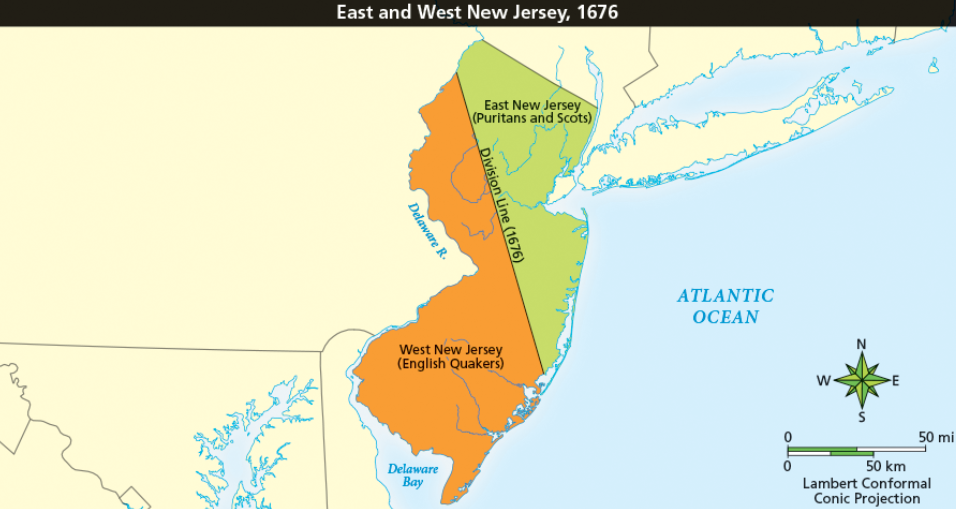
New Netherlands/New York
New Netherlands:
est. by Dutch to trade/farm
tolerated diverse groups
little effort to convert natives
Few ppl moved from Netherlands
Better life in Netherlands, colony = feudal system
New York:
taken over by English
Eng. wanted to close the gap between southern + new England colonies
Pennsylvania
William Penn = given charter from King of Eng.
Quakers: Inner light, personal relationship w/ God, pacifists
est. as place of religious tolerance/haven for Quakers
New Sweden/Delaware
New Sweden:
est. by Dutch to join the tobacco trade, fur trade, grains trade, etc.
Delaware:
Absorbed by New Netherlands, then Britain
Chesapeake and Southern colonies
Virginia, Maryland, North Carolina, South Carolina, Georgia (VA, MD, NC, SC, GA)
Forests on rolling hills/mountains + rivers/streams
Mild winters, warm summers = long growing seasons
Rich soil, farmed tobacco corn, peas, etc.
cotton = main export
Society = mainly young adult men
Peak physical state —> do labor
GOAL = increase wealth
Saw natives as uncultured, just wanted their land
HOB
Stono Rebellion = slave uprising
Virginia Colony
Atlantic coast = unclaimed by Spain/France —> English colonization attempts
Sir Walter Raleigh attempted est. at Roanoke 2x (failed)
Jamestown Colony (funded by VA Co.) = success
Good harbors, fertile soil, swamps, protected from spanish
John Smith wanted to take Native land —> conflict with Powhatans
Originally OK relationship w/ Natives (learned their techniques) when they were struggling
Sick from malaria etc. —> too sick to tend crops —> starvation
Later turned on natives
VA Co. saved colony by allowing colonists to own/work land as private property
Ppl = farmers, not employees —> working harder to grow corn, squash, etc.
Ensured survival, but not profit
Tobacco —> huge profit
John Rolfe taught colonists to farm tobacco 1616
profits attracted more immigration
Headright system —> more immigration
More wars w/ NAs (Opechanchanough)
Bacon’s Rebellion
William Berkely = governor
Virginia House of Burgesses
1619 est.
Representative gov.
VA = originally proprietary, later royal colony
Male landowners elect 2 leaders = Burgesses to represent settlement
Maryland
Lord Baltimore = aristocrat
Governed as proprietary colony
est. as Catholic haven who were discriminated by Protestant majority in Eng.
More protestants than Catholics ended up immigrating —> conflict
Georgia Colony
James Oglethorpe + trustees
Safe haven for eng. debtors who had been jailed for being unable to pay debts
est. also to protect SC from Spanish Florida
Strict rules: no alcohol, no slaves, colonists had to work their own land (no owning plantations)
Angered colonists —> protesting until trustees surrendered the Crown —> royal colony
plantation system
Unlike small subsistence farms, plantations = est. to grow cash crops + make money
Cheap labor
Economy based on agricultural mass production
a few crops grown on large farms worked by laborers or slaves
class conflict
poor were very underrepresented in the government, and had higher taxes b/c HOB = wealthy 1st class
were forced to move westward for land —> more NA conflict —> low class mad at wealthy class
Bacon’s Rebellion
Increase in VA population —> poorer ppl moving westward (land is less fertile) —> intruding on NA land —> conflict w/ NAs
William Berkely = royal governor of VA
Made situation worse: increased taxes on low class and gave it to wealthy class
Also disregarded free press/public education for common people
Berkley was unwilling to go to war w/ NAs/get rid of them —> settlers rebelling under Nathaniel Bacon
Bacon = already known for NA slaughter
1676 Bacon’s Rebellion drove out Berkely + burned town
Bacon died 1mo. later (sick) —> rebellion end
Berkely regained power but rebellion undermined his credibility
King appt. new governor, Berkley —> england
Rebellion showed poor class wouldn’t tolerate a government only catered to wealthy ppl
Colonial leaders reduced taxes + increased access to frontier land
slave culture
Stono Rebellion
1739, near Charleston SC
Largest uprising of enslaved ppl
burned houses, killed white ppl
led to suspension of slave imports + harsher slaves codes
more efforts to forbid education + movement of enslaved ppl
also led to more uprisings (Nat Turner’s Rebellion = most effective slave uprising)
cash crops
Tobacco in VA
cotton in southern colonies
Grain/wheat = NOT a cash crop (sustenance crop)
Although New England and the Chesapeake region were both settled by people of English origin, by 1700 the regions had evolved into two distinct societies. Why did this difference in development occur?
Geographical differences
New England = rocky + colder —> more difficult for large scale farming = difficult to have plantations
Chesapeake = mild winters + warm summers = long growing seasons + good for agriculture
VA and other southern colonies est. in hopes of making MONEY
Religious differences
New England = lots of religious conflict (stronger views/beliefs) w/ natives and within society
Lots of Europeans settled in New England to gain religious freedom/expression
Chesapeake = lot less religious conflict
religion = more important/dominated life in new england
farming = more important/dominated life/money in chesapeake
Societal differences
New England = brought families, = amt men/women, diverse
Southern = young adult men, servants or wealthy, intended to make money or increase social standing